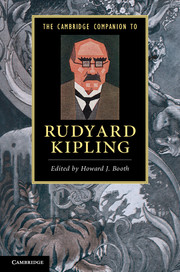Book contents
- Frontmatter
- Introduction
- 1 Kipling and the fin-de-siécle
- 2 India and empire
- 3 Kipling’s very special relationship: Kipling in America, America in Kipling
- 4 Science and technology
- 5 Kipling and gender
- 6 Kipling and war
- 7 Kipling as a children's writer and the Jungle Books
- 8 'Nine and sixty ways’: Kipling, ventriloquist poet
- 9 Kim
- 10 The later short fiction
- 11 Kipling and postcolonial literature
- 12 Kipling and the visual: illustrations and adaptations
- 13 Reading Kipling in India
- Further reading
- Index
10 - The later short fiction
Published online by Cambridge University Press: 28 September 2011
- Frontmatter
- Introduction
- 1 Kipling and the fin-de-siécle
- 2 India and empire
- 3 Kipling’s very special relationship: Kipling in America, America in Kipling
- 4 Science and technology
- 5 Kipling and gender
- 6 Kipling and war
- 7 Kipling as a children's writer and the Jungle Books
- 8 'Nine and sixty ways’: Kipling, ventriloquist poet
- 9 Kim
- 10 The later short fiction
- 11 Kipling and postcolonial literature
- 12 Kipling and the visual: illustrations and adaptations
- 13 Reading Kipling in India
- Further reading
- Index
Summary
A line of Kipling critics have identified the late short fiction as his best writing. Although this remains a minority view, the later collections are central to debate on his relationship to modernism. Kipling's extended career meant that he had a worldwide reputation at the end of the nineteenth century, but was still publishing new work in the 1930s at the end of the modernist period. Here the focus will be on evaluating the later fiction precisely as 'late' and 'untimely' work.
Little or no reference is made to Kipling's later writing in a number of classic accounts of the short story. H. E. Bates in his 1941 study only refers to Kipling's Indian writing and dismisses him for his support for imperialism. Indeed Bates finds Kipling no more than 'an interesting pathological study', with no signs of 'fine quality' in the writing. Frank O'Connor offers more in the way of engagement with Kipling's writing in his The Lonely Voice (1962). He notices that Kipling was more interested in groups and on the effect his tales had on his readers than on internal character development. Seen as in flight from the loneliness in his own life and therefore afraid of depicting isolation in his stories, Kipling is seen by O'Connor as unable to become 'the lonely voice', the truly modern short fiction writer who expresses the isolation of the modern individual.
- Type
- Chapter
- Information
- The Cambridge Companion to Rudyard Kipling , pp. 141 - 154Publisher: Cambridge University PressPrint publication year: 2011
- 1
- Cited by



